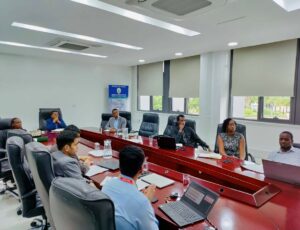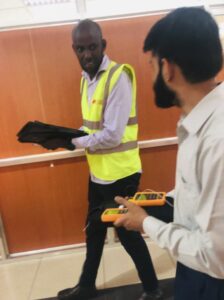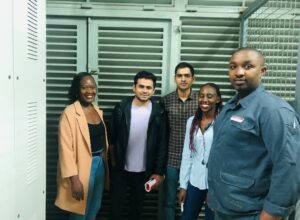The Global Green Growth Institute (GGGI) in collaboration with the Rwanda Ministry of Infrastructure (MININFRA), are implementing a project preparatory work to assess the energy efficiency market in Rwanda and develop a new financial vehicle that can support the implementation of the energy efficiency initiatives. The preparatory work is funded by the Korea Ministry of Economy and Finance (MoEF) under the GGGI – Korea Trust Fund.
Super ESCO (Energy Services Company), the name and the concept may sound new to many Rwandans however such type of facilities are quite common in the developed world and many emerging economies. Super ESCOs typically as the name suggests is a ‘Mother’ ESCO and are typically backed by the governments to drive energy efficiency transformations in the country. Energy Efficiency Services Limited (EESL) is a Government of India owned Super ESCO that has saved India over 47 billion kWh energy annually while reducing 36.5 million tons of carbon emissions. In Africa, Morocco and Kenya are currently setting up Super ESCO facilities in collaboration with the African Development Bank (AfDB) to drive the energy efficiency transformation in their respective economies. Super ESCO facilities align with the delivery of Paris Agreement goals especially the mitigation actions under energy efficiency. Super ESCO aggregates the demand for energy efficiency (for example – installing LED lights in all public buildings), conduct bulk procurement to reduce the cost of the technologies, finance and implement the energy efficiency initiatives and develop ESCO ecosystem in the country. The Super ESCOs are typically paid back by the project beneficiaries over a span of time based on the energy savings achieved. Under this project, GGGI in collaboration with MININFRA will evaluate the scope of setting up a Super ESCO facility in Rwanda.

Figure 1: Inception Meeting between MININFRA, GGGI and PwC team
However, before such a facility is set up a policy, regulatory, capacity, and technical assessment needs to be conducted to help design the facility. GGGI has commissioned studies to understand the market for energy efficiency initiatives and solutions by identifying priority areas of interventions and investments that will ultimately contribute towards Rwanda’s energy sector and climate change goals.
On 26th September 2022, GGGI appointed the consultant firm PricewaterhouseCoopers Private Limited (PwCPL), India to assess the energy efficiency market in Rwanda. From 7th – 21st November 2022 PwC team comprising of certified energy auditors conducted Detailed Energy Audits (DEA) of a sample size of 13 buildings /facilities in city of Kigali across various building. During the same period, stakeholder consultations were conducted by GGGI and PwC to identify an appropriate institution that can host the Super ESCO facility including the assessment of institutional mandates, capacity, technical, and financial capabilities based on the implementation of the past, present and future energy efficiency projects.
I along with my colleague Diane Umukunzi Uyambaje (GGGI Rwanda District Technical Assistant) were part of the team facilitating the Detailed energy audits, we covered a wide range of building/facility under different typologies including offices, commercial building, hotels, heath care, education building, water treatment plant & pumping stations and streetlighting systems. Several audit related tests were conducted such as measuring the performance of the transformer, electrical system, Air conditioners, pumps, electrical motors, lighting and diesel generator sets in the 13 buildings /facilities. A team from Rwanda Energy Group (REG) also accompanied us during these audits and understood how the various facets of the audits.


I learned a lot from the team of PwC certified energy auditors including how detailed energy audits help in identifying energy saving potential, safety concerns with electrical systems like wiring which makes building safer as well as how auditors conduct walkthrough audit of the building, looking at its electrical appliances adding different instruments (power analyzer to measure the flow of power (w) in an electrical system, anemometer to measure air velocity, lux meter to measure the lighting levels, thermal gun to identify any leakages in the air-conditioning ducts, ultrasonic flow meter to measure the flow of water, and digital thermometer to measure temperature in a given space) to record measurements related to quality of operations and efficiency of building appliances.
The audits would not have been possible without the support of the respective building managements and facility managers who are also eager to understand the current performance of their buildings/facilities and the various energy efficiency initiatives that could be implemented.
My sincere appreciation to all building managements, facility managers for their time, collaboration and support during the detailed energy audits.
The audit results will first help us understand the potential energy savings measures in the audited facilities and will also help to estimate the detailed energy efficiency potential in Rwanda and coming up with a detailed market assessment of energy efficiency potential in Rwanda under Non-residential building. The results from the detailed energy audits will be utilized to enable ecosystem for the development of the ESCO market in Rwanda, setting up of a SuperESCO facility that could act as a catalyst in expediting energy efficiency initiatives. A government backed SuperESCO in Rwanda or a public ESCO has the potential to overcome a number of barriers and tap into new service offerings to drive energy efficiency transformation in Rwanda.

Author: Sylvie NYIRAHIRWA, sylvie.nyirahirwa@gggi.org , nyirasylvie1@gmail.com
Inputs by: Dheeraj Arrabothu, Project Manager & Senior Officer – Green Buildings